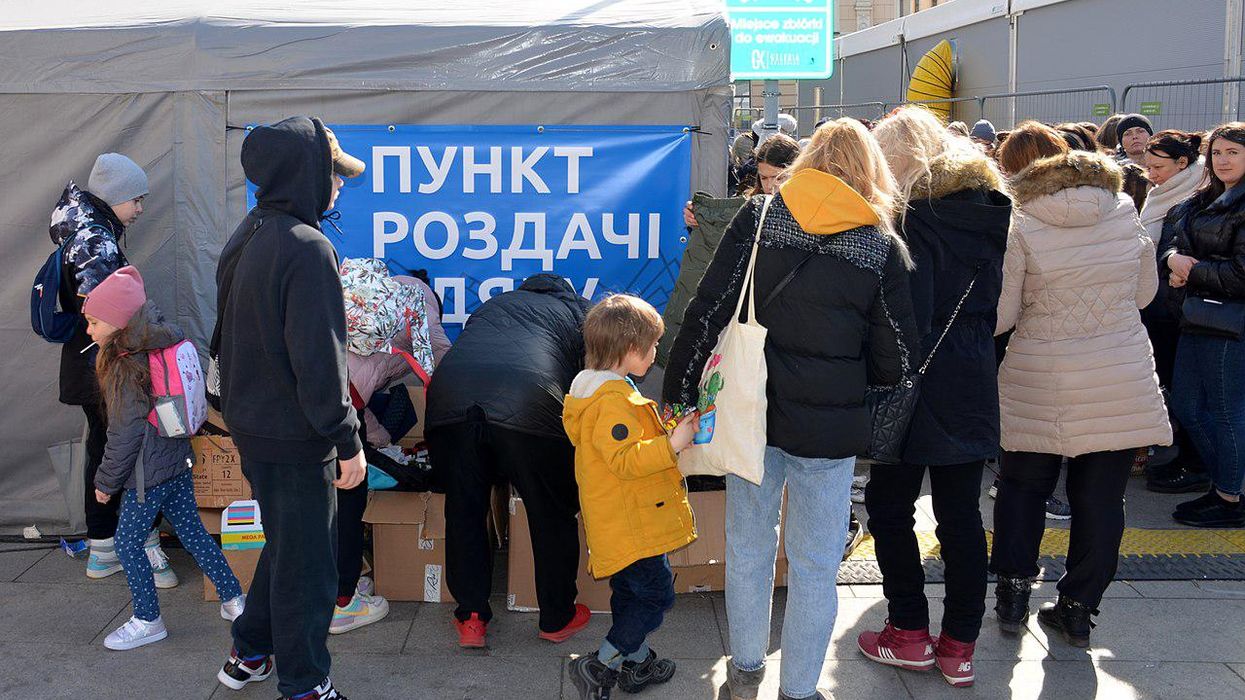NY Times roundtable grapples with the Ukraine war’s political, military and economic ramifications

Ukrainian refugees in Krakow, Poland on March 20, 2022, Wikimedia Commons
March 25, 2022 | 01:30PM ETWorld
When Russian forces, on orders from President Vladimir Putin, invaded Ukraine on February 24, Europe entered its worst military crisis since World War 2. More than 3.7 million Ukrainian refugees have fled the country, thousands of people have been killed, and national security experts in Washington, D.C. fear that the worst fighting is yet to come. It remains to be seen how long the Ukraine/Russia war will continue, and four opinion journalists for the New York Times — Lulu Garcia-Navarro, Thomas L. Friedman, Ross Douthat and Farah Stockman — examined the conflict’s possible military, political and economic consequences during a roundtable discussion published as an opinion article on March 24.
\u201cWe\u2019re protected by two big oceans over here in the United States. The war still feels far away,\u201d @fstockman says in today\u2019s Opinion roundtable, where she shares the alarming sense of worry in Europe she saw when reporting in Poland recently.https://nyti.ms/3JJDeXR— New York Times Opinion (@New York Times Opinion) 1648216721
Garcia-Navarro, also known for her work for National Public Radio (NPR), led the discussion, asking the others to address the possible consequences if Putin uses chemical weapons — or, in a “worst-case scenario,” nuclear weapons — against Ukraine.
Friedman argued, “If Putin were to introduce any kind of weapon of mass destruction, chemical or nuclear, I think that would also be a real problem for the Chinese. I just assume it would be some desperation Hail Mary kind of thing to depopulate Ukraine and basically force the entire population onto the rest of Europe and create some havoc there. But I find it hard to see it as part of any sort of strategy right now to win the war and be able to consolidate the gains.”
Putin has obviously encountered a much stronger resistance from Ukraine’s military than he anticipated, and Ukrainian President Volodymyr Zelensky has assured President Joe Biden and the United States’ European NATO allies that he plans to keep resisting Russian forces as vigorously as possible.
Stockman told her colleagues, “I think people should brace themselves for terrible things to be done — terrible things to come out of the war, even by the Ukrainian side. Right now, we see a lot of social media about Ukrainians rescuing cats and dogs, and they’re so good at communication and getting their message out. But war is ugly and awful. And the longer this goes on, the more you’ll see allegations of war crimes, allegations of far-right militias getting involved. Right now, in Mariupol, one of the fiercest defenders of Mariupol is a battalion that’s associated with the far right.”
Stockman added, “Russia is in it for the long haul. They care a lot more about Ukraine than the average American.”
Video verified by The New York Times shows the bombardment of Chernihiv, Ukraine, on Thursday. As smoke cleared from the attack \u2014 which hit near apartments, pharmacies and a hospital \u2014 people are seen running in the street.\nhttps://nyti.ms/3sE87XD\u00a0pic.twitter.com/S2l2MBkxaF— The New York Times (@The New York Times) 1646323203
The Biden Administration, along with NATO, has responded to the invasion of Ukraine with tough economic sanctions. Douthat warned that the economic pain being inflicted on Russia will affect the U.S. and Western Europe as well.
Douthat noted, “The level of pain already being inflicted on European economies is substantial…. In certain ways, Putin still has the power to inflict economic pain on the West…. I think we’re in uncharted territory with the economic warfare.”
President Biden met with members of the 82nd Airborne Division at their barbershop in Rzeszow, Poland, on Friday. The division was deployed from Fort Bragg, North Carolina, in February as part of the increase of American troops in NATO\u2019s eastern flank. https://nyti.ms/3NobM44\u00a0pic.twitter.com/ha4rTtzUvT— The New York Times (@The New York Times) 1648222508
Stockman, who recently visited Warsaw, Poland, shared her experiences with her Times colleagues.
“People were absolutely freaking out when I was there,” Stockman explained. “We’re protected by these two big oceans over here in the United States. The war still feels far away. But when you’re in Warsaw, you’re a ten-hour drive from Kyiv. If you’re in Berlin, it’s, what, 15 hours? It’s not far away. And people were really worried.”
Stockman continued, “I think the issue is, if Putin keeps threatening to use nuclear weapons, what can you do to respond? Because if you give in to the threats, he can just push NATO further and further away. He can keep demanding a buffer zone. He can keep expanding his power into Europe. And that’s unacceptable. But the opposite is also unthinkable, which is to respond in a way that will draw NATO in and literally have World War III. So, it’s really serious.”